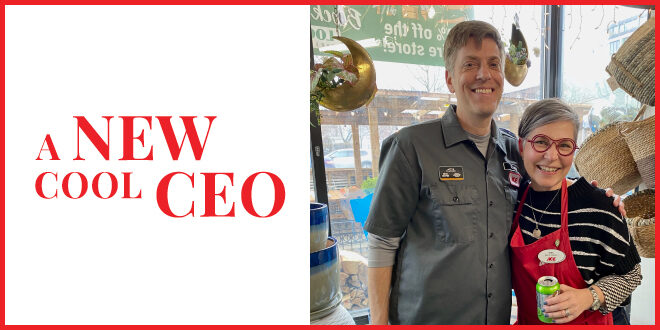Buying and Selling: Whether you’re looking to grow or sell, if you need financing or valuation services, the NHPA Retail Marketplace has options. Visit YourNHPA.org/marketplace to learn more.

Transition is part of the natural evolution of a business, whether you pass a business to a new leader or the business closes. Two decades ago, Gina Schaefer, founder of A Few Cool Hardware Stores, was new to the independent home improvement industry, but people were already asking about her transition plans.
“I opened Logan Hardware when I was 30, and people almost immediately started asking me what my exit strategy was. And I thought that was such a weird question at the time, because I was young and brand new. Why should I think about selling it?” Schaefer says. “I realize now, in hindsight, there are details that you put in place along the way to make that process easier, like have clean books, do everything above the bar and have professionals help you with your finances. I’m so proud we did all those things along the way because it made this experience so much smoother.”
As a result of implementing those strategies early on, Schaefer and her husband, company CFO Marc Friedman, are now in a position for Schaefer to make a smooth exit. In late April, A Few Cool Hardware Stores announced the next foray of leadership for the company: Craig Smith, owner of Fairfax Ace Hardware in Fairfax, Virginia, has joined the company as co-CEO.
In 2021, Schaefer and Friedman decided that making their company an employee stock ownership plan (ESOP) was part of the transition plan for A Few Cool Hardware Stores. They worked with a comprehensive group of consultants—lawyers, financial advisers, tax specialists—to be sure they were doing it the right way.
The next step was finding Schaefer’s replacement to lead the company, which at the time comprised a dozen stores in Washington, D.C. and Baltimore.
Smith has deep roots in retail and the independent home improvement industry, growing up in his father’s retail pharmacy. He later served as manager of Strosniders in Bethesda, Maryland, before opening Fairfax Ace Hardware in Fairfax, Virginia, in 2011. Schaefer and Smith have been peers for over a decade, with Smith leading the region’s Ace retailer group that Schaefer and her team have been active participants in.
“My deepest memories are getting to know Craig through those group meetings, and then watching him interact with the rest of my back office,” Schaefer says. “Just in terms of cultures aligning and personalities syncing, I had already watched Craig interact with the people in my company, and they all seemed to really like and respect each other.”
Schaefer says considering Smith to take over the business came to her a bit by surprise, but once she had the idea, it seemed like the obvious answer.
“I remember one day texting Marc saying, ‘What do you think about Craig?’ And his answer was something like, ‘that almost seems like a no-brainer,’” she says. “But first, Craig had to agree. And so we took him to lunch.”
When Schaefer and Friedman invited him out for lunch in March 2022, Smith says he didn’t think the conversation would be about him becoming CEO of their company.
“I just thought they wanted to see my store. I knew they were thinking about doing something in Alexandria similar to what Fairfax has done in regard to outdoor power and barbecue,” Smith says. “We went to a restaurant nearby, they sat me down and blew my mind.”
Smith knew it was a unique opportunity, but he had to contend with what that meant for his position as a sole business owner.
“I had done business the way I wanted to do it for a long time, a decade plus, and this was some folks coming to me and saying, ‘Do you want to do something with us?’ Being part of a team rather than a lone wolf—there’s some risk involved,” he says. “But I don’t know if I would ever see another opportunity like this in my entire lifetime. So I told them I was excited about the opportunity, then I discussed it with my family and happily accepted.”
The transition process took place over the course of the next year, which included finalizing the sale of Fairfax Ace to A Few Cool Hardware Stores. Schaefer says agreeing on the terms of the sale was one of the simpler parts of the process, especially due to Smith’s attention to business details.
“Sometimes people go through this process and they have skeletons they’re trying to hide or they’re trying to recover from something they hadn’t disclosed,” she says. “To Craig’s credit, he ran such a clean, successful business that getting the valuation for it was seamless.”
Exploring Expansion: Learn how one company with growth goals evaluates businesses for acquisition, and hear the story from the seller’s perspective at hardwareretailing.com/outside-buyer.
How an ESOP Works
1. Set Up a Trust
The owners set up a trust in the form of a government-qualified pension plan to hold the shares of the company on behalf of the employees. All employees have an account with the trust.
2. Take Out a Loan
If the ESOP doesn’t have enough cash to purchase all of the owner’s shares, the trust takes out a loan to purchase, with the value of the shares determined by an independent appraisal. An owner can sell all their shares upfront or a certain percentage of shares at a time.
3. Pay Down the Loan
The business pays down the loan using its profits, and once the loan is paid off, those profits are shared with all employees by increasing the ESOP. The ESOP is essentially a long-term retirement plan, where the ESOP holds the shares with an evaluation done by an independent appraiser each year to determine value.
4. Shares Allocated to Employees
The ESOP shares are allocated to the eligible employees based on several factors, such as years of employment and wages, with each ESOP differing in both employee eligibility and the stock allocation method. When an employee leaves the company, their shares are cashed out, similar to a retirement plan.

As a result of the sale, all 32 employees of Fairfax Ace are now part of all A Few Cool Hardware Stores offers, including becoming part of the ESOP. The arrangement has already transferred 30% of company ownership to employees through a trust that allocates shares to eligible employees over time.
While Smith and Schaefer agree that an ESOP isn’t necessary to complete a transition like this, Smith says that structure was part of what made this plan so attractive to him.
“Part of the reason that led me to this company is because it is an ESOP. So I appreciate that it’s there,” Smith says. “From my team’s perspective, too, my decision to join this company means they are going to have better benefits, more professional development and access to an ESOP. Who wouldn’t be thrilled by that?”
While the ESOP was a determining factor in Smith’s decision to join the company, the culture that Schaefer has created and the opportunity to continue her legacy were also key.
“The facets Gina and her talented team have embedded in the company culture—giving people second chances, engaging the community and operating with thoughtful core values—have laid a rock-solid foundation and paved the way for a bright future,” he says.
Now in the final phase of her transition plan, Schaefer’s advice to the next generation is not to wait until it’s time to exit. Start your plans now, and don’t dismiss any options until you’ve seriously considered everything.
“When Marc and I started this process, we evaluated every option. Nothing was too scary or off limits. We talked about selling to private equity, we talked about selling to a bigger retailer, we talked about selling to our managers and forming some kind of employee co-op,” Schaefer says. “We didn’t rule anything out until we ruled it out. An ESOP is not cheap, but there are lots of really great benefits that personally align with our values.”
Several years ago, Smith and his brother each owned a 50% stake in each other’s businesses, and they made the decision to buy each other out. He says going through that process gave him insights that made this transition smoother, but he also cautions retailers who haven’t thought through a succession plan.
“As great as this opportunity is for me, as an owner, you don’t want to be forced into something like this. You want to be able to choose your path as the owner,” he says. “If you let it languish, then you will be eventually forced, and that’s not preferred.”
Currently, the co-CEOs have agreed that Schaefer will remain in her position until mid-July, at which point they will re-evaluate to decide if she can step away completely. Learning and growth are at the top of Smith’s to-do list until then and beyond, and he says he’s excited about the possibilities.
“I really enjoy every day because every day is different. I like visiting different locations and talking to different people. There are so many players here to get to know,” he says. “I’m really excited for what’s on the horizon. Gina and Marc and their team have built an amazing business and to know that we can grow it even further is really exciting. Every day that goes by, I am more confident that I made the right decision by joining this company.”
 Hardware Retailing The Industry's Source for Insights and Information
Hardware Retailing The Industry's Source for Insights and Information








